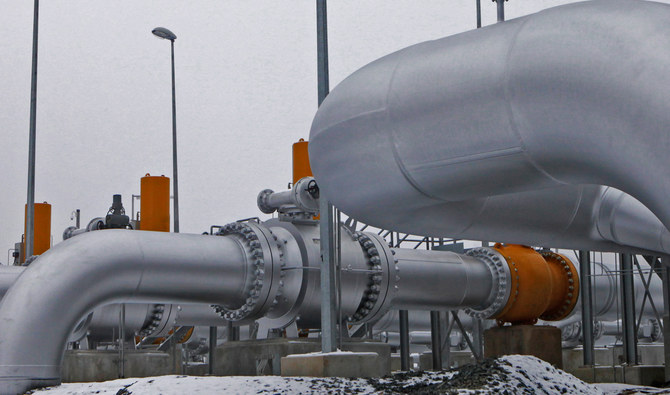KARACHI: As Pakistan plans groundbreaking of around $3 billion gas pipeline by the year-end with financial and technical support from Russia, experts have suggested Islamabad to "tread carefully" and being skeptical of the materialization of the project after sanctions slapped on Russia for invading Ukraine.
In 2015, Islamabad and Moscow signed an Inter-Governmental Agreement (IGA) for the construction of a 1100-kilometer-long pipeline to carry 1.6 billion cubic feet per day (bcfd) gas from Karachi to Lahore. In the initial agreement, Russia was supposed to provide almost 84% of the financing with pipeline operation rights for 25 years. But in May 2021, an amendment to the original agreement was made, which now allows Pakistan to hold the majority 74% stakes in the project, while Moscow will have the remaining 26% shares.
Pakistan and Russia agreed to move forward on the project, the North South Gas Pipeline (NSGP) renamed as the Pakistan Stream Gas Pipeline (PSGP), during Prime Minister Imran Khan's visit to Moscow in February, which coincided with the Russian invasion of Ukraine.
Most of the work on the project has been completed and both sides were "on track and targeting for the groundbreaking later this year" after front-end engineering and design study that require up to seven months, according to Pakistan’s energy minister, Hammad Azhar, who was accompanying PM Khan on the Moscow visit.
Though no statement has been issued from either side since the Russian invasion, but officials say the project is "intact" as per the plan.
“Both countries have signed modalities for the project and they will come for assessment,” Muzzamil Aslam, a spokesman for Pakistan’s energy ministry, told Arab News earlier this week. “It is intact as per the plan and the policy.”
Aslam, however, believed neither of the parties had discussed the project since the invasion of Ukraine on February 24.
“I don’t think the two parties have further deliberated on the project after the problems in Russia,” he said. “The project is in the preliminary stages and will come to ECNEC (Executive Committee of the National Economic Council) and the ECC (Economic Coordination Committee) at later stages.”
Pakistan, which is currently facing depletion of local gas reserves at a rate of 9 percent per annum, largely depends on external sources to meet its energy needs.
“From a purely energy security standpoint, this project would be a big win for Islamabad, if it goes ahead,” Michael Kugelman, deputy director for the Asia Program at the Washington-based Wilson Center think-tank, told Arab News on Saturday.
“Pakistan is energy-deficient, other gas pipeline projects like TAPI (Turkmenistan-Afghanistan-Pakistan-India) and the one with Iran have lapsed, and it would help Pakistan’s goal of deepening ties through connectivity,” Kugelman said.
“In effect, it would help move the needle forward on the much-ballyhooed shift from geopolitics to geo-economics. It would also be a win for Russia, isolated and sanctioned, which would welcome the revenue and engagement that would come from the project.”
But some analysts believe that the image of PM Khan standing with the Russian president on the day of the invasion of Ukraine has displeased the South Asian country’s major trading partners, the United States (US) and Europe.
“The US is not happy with Prime Minister Imran Khan’s embrace of Russia at a time when Russia is an international pariah,” Husain Haqqani, a scholar at the Hudson Institute in Washington and the former Pakistan ambassador to the US, told Arab News.
“The image of him standing next to Putin on the day of the invasion of Ukraine will adversely affect US-Pakistan relations for some time.”
Kugelman agreed with Haqqani and suggested Islamabad to "tread carefully," pointing to some major geopolitical and diplomatic risks.
“There certainly are major geopolitical and diplomatic risks at play. Islamabad may be resorting to anti-West rhetoric for domestic political reasons, but it has important trade relationships with Western countries, especially in Europe,” the expert said.
“So, Pakistan will need to tread carefully. It wouldn’t want to lose those links with the West by going afoul of sanctions. India, with its much deeper and broader based relations with the West, has more of a safety net and doesn’t need to worry as much about angering the West and suffering blows to its relations with them.”
Terming the project "unrealistic," analysts said the translation of Pakistan's pipeline dream with Russians would remain unmaterialized.
“The irony is Pakistan will not get anything from Russia while it is under international sanctions. Gas pipelines take many years to build and cost a lot of money,” Haqqani said.
“Pakistan’s plans for a gas pipeline from Iran were also never fulfilled. Announcing such projects is unrealistic and reflects the tendency of Pakistan’s leaders to try and get a positive headline for a day, rather than focusing on realistic economic plans.”
Islamabad has also signed an agreement with Iran for the construction of the Iran-Pakistan-India (IPI) gas pipeline. Under the agreement signed in 2009, the project was to be completed by December 2014 and deliver 760,000 million cubic feet of gas per day to Pakistan.
The Turkmenistan-Afghanistan-Pakistan-India (TAPI) gas pipeline project aims to bring natural gas from the Gylkynish and adjacent gas fields in Turkmenistan to Afghanistan, Pakistan and India. TAPI project was signed by the four countries in February 2016.
Besides sanctions, analysts said Russia might also face pressure from India, which is a longtime friend of Moscow.
“Also, Russia will likely face pressure from India, its longtime friend, not to go through with it. So there will be hesitation from both sides,” Kugelman said. “In the end, though both countries have compelling reasons — economic, strategic and energy-related — to try to go through with it.”
Despite a delay in the PSGP project since 2015, Pakistan also plans to import Russian gas through Kazakhstan and Uzbekistan, according to energy minister.
















